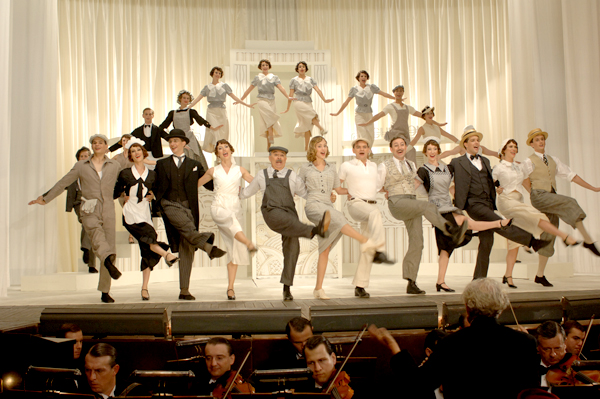|
Reviews of Recent Independent, Foreign, & Documentary Films in Theaters and DVD/Home Video

PARIS 36 The Eiffel Tower looming in the evening skyline, rooftop romance, a swanky nightclub with nude dancers a la Follies Bergère—you don’t have to look to TCM for fabricated fantasies of pre-war Paris. If this back-to-basics backstage musical is any indication, the French worship the mythic city of lights even more than Hollywood. (Ironically, most of Paris 36 was shot in the Czech Republic.) Mickey and Judy’s “let’s put on a show” ethic meets hard-knock Goldigger drama in a plot that is as mechanical as they come. The film opens at a police station, with roly-poly Pigoil (Gérard Jugnot) being questioned for murder. As Pigoil begins his confession and an officer types his statement, the screen fades to a few years earlier in the mid-1930s. The doors to the bankrupt Chansonia music hall, where he has worked as a stagehand for 35 years, have been nailed shut, and, dumped by his younger wife, Pigoil hits the bottle, while his son, little Jojo (Maxence Perrin), hits the streets, busking with his accordion (someone in the household has to pay the bills). Unable to find work, Pigoil loses custody of his son to his now bourgeois ex. Pulling himself up by his bootstraps, Pigoil convinces his former and now jobless comrades from the theater, including a commie rebel rouser and a down-on-his luck vaudevillian, Jacky (Kad Merad), to join him in reopening the hall. Labor will take over the management, working for free until the theater gets back on its feet. Now all they need is the girl. No matter how improbable or predictably the plot turns, the sincerity of the actors save the film from getting the hook. As the small-town blonde ingénue who becomes the Chansonia’s biggest headliner in decades, newcomer Nora Arnezeder seems as genuinely shocked as everyone else that she can sing and command a stage. The chanteuse easily stands out from the bevy of bottom-of-the barrel acts. It also doesn’t hurt that she has great gams. To the script’s credit, there’s an acknowledgment of the world beyond the stage door. (The Warner Brothers musicals that this film repeatedly references were just as outright political, but without the foresight.) The Chansonia company is very much pro-Léon Blum, the leftist Popular Front leader and France’s first Jewish prime minister, while the theater’s right-wing landlord fronts a group of fascist thugs. Meanwhile, Jacky, takes a side gig entertaining the fascists with racist and anti-Semitic buffoonery. It’s the only time he has an audience eating out of his hands; otherwise, at the Chansonia, he lays an egg. Reality glances but doesn’t pop the music’s bubble; the World War II years, though foreshadowed, are entirely skipped, but a climactic act of violence almost ruins the buzz. Fortunately, considering the number
of songs, the original score feels entirely period appropriate. Any
Broadway producer would be lucky to have such catchy and varied songs,
which, like in the musicals of the period, are barely woven into the
story, including one eye-popping, song-and-dance number whose sole
purpose is to entertain. Without a touch of irony, Paris 36’s
forthrightly corny. Kent Turner
|

